Sometimes, things don’t quite work out as you hope. Part of our role in News Labs is to experiment, and to explore the limits of technology in the news cycle. We tried something, and it didn’t quite work out. But we learned a lot.
Background
For the general election of 2019, members of the BBC News Labs team published more than 100,000 words overnight—including 40 articles in Welsh—using our Salco (Semi-Automated Local Content) engine. As election results were called in constituencies across the country, we fed results data into Salco and it gave us back a news article summarising each win, reading for subbing and publishing.
Ahead of the 2023 local elections, we wanted to see if we could use Salco to produce insightful journalism ahead of the elections, and at the hyper-local level.
Local stories
Research by BBC teams has shown that audiences value local content, and that local references make people feel acknowledged by the BBC. Audiences want information about where they live or where they are from, and seeing the name of their town or village grabs their attention.
But token references are not enough. Making an article worthwhile requires significant insight into the location we’re talking about and that intersection between data and regional journalists’ local knowledge was the subject of our latest experiment with Salco.
And when it comes to audience interest, how local is local? The scope for what is considered “where I live” varies massively between remote, rural settlements and city boroughs.
In search of data
Initially, we were pegging the Salco research on the May 2023 local elections in parts of England. We knew that there was significant amounts of data available at the ward level through the Office for National Statistics (ONS) — who were incredibly open and helped us gain an understanding of the census data and showed us other available datasets — and we thought we could lever this to create hyperlocal stories. However, we rapidly discovered that finding data pertaining to issues controlled by local authorities — the issues on the ballot — was going to be a sticking point. We risked trying to shoehorn the narrative of a story to the data that was available.
Another problem with going hyper local with data-sets is that inconsistencies or perceived trends in the data can become amplified when the sample size is relatively small. There is less opportunity for quirks in the datapoints to average out and become inconsequential. And if we’re using data to create many, many stories across a region or across the country, then how do we bring in editorial balance to every story when they describe the entire range of the data spectrum?
Bringing the national, local
We involved BBC journalists from several regional teams throughout the project, discussing their approach to local storytelling and how they thought this sort of semi-automated story creation could fit into their work. “National issues are becoming the currency of local news” said one editor — audiences are interested in how national issues can impact their local areas.
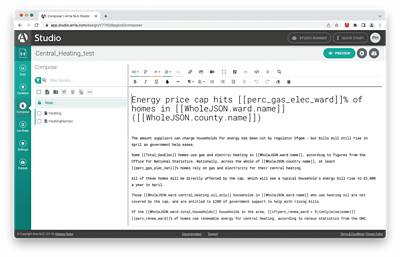
So we started building a template that took a contemporary BBC news stories, and explored how these would look with a section of statistics local to each reader. Could we use census data on the types of central heating people in an area use and link that to the rise in fuel prices? Could we make a national news story about increasing hospital waiting times more relevant to a particular area instead of just quoting a national average and offer audiences the average waiting times for their own local NHS trust?
We found that we could.
A method of delivering these stories to audiences, was another, well, story. The BBC News site has indexes for regions and areas within these regions, but they only go down to a certain level of ‘local’. There are BBC topic pages for towns across the UK, but how would they look if we were flooding them with similar looking stories for every ward in the area? The BBC’s publishing platform does not have a way of automatically serving such modular content to users based on their preferences or location, at least not yet.
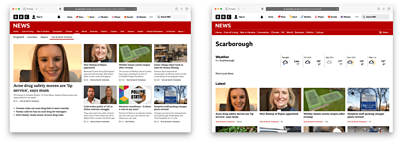
Data can be a tricky thing. How can we ensure every story is reliably checked before being published? Creating stories for every town in a region — let alone every electoral ward — would place a huge burden on editors. And if the data appears to cast a local authority in a poor light, how can we ensure a right to reply in each article?
Combining multiple data sources
After experimenting with different data-sets and different types of stories, we decided to focus our research on building a system that would simplify the act of bringing together multiple data sources. We would create a pipeline that flows from ingesting data to creating templates that use it in story production, and then presenting it to regional teams on a dashboard.
Our engineers came up with a method to amalgamate multiple data sources, matching different levels of locality to a standard format, and produce an output that could be used with the article templates. We used a third-party system, Arria NLG Studio, to author the stories, and within our automation pipeline, each new local data file triggered an automatic call to Arria to essentially feed the data into Arria and get a local story back. The advantage of using Arria (an off-the-shelf tool) to transform our structured data into readable stories is that it also contains a lot of natural language processing tools, such as automatically transforming “a” to “an” if the following word begins with a vowel.
We collated these stories in a dashboard, providing regional journalists with a central hub where they could search for stories in their patch and explore the data in an accessible format.
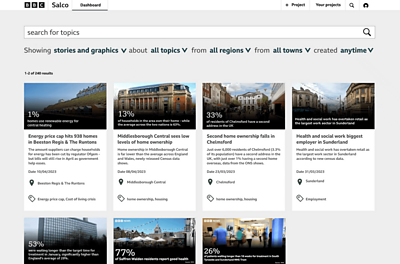
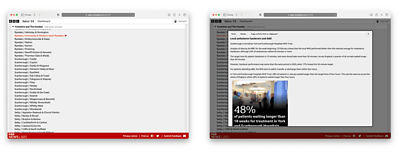
Modular content
During the limited audience trial we conducted, one aspect that stood out was the modular format of the article we produced. Crossheads (short sub-headings in the article) broke up the text and introduced a section. The copy below it was short, and limited to the data point. Audience members said they liked this format as they could scan the sections, and jump to areas of interest.
And with each section making sense on its own, it paves the way for a more modular approach to this form of journalism — where editors can pick and choose which sections they may want to include into a story. In future, personalisation in the BBC News app could allow audiences to set preferences to what they do or do not want to see, and in what order.
Why stop with text?
We know audiences want to see stories which have texture - a mix of imagery, graphics and text, as it provides a richer experience. But that requires extra resources and there is resource and time pressure on journalists to create them. We wanted to explore whether we could automatically create graphics using data, localising them in terms of both messaging and imagery.
We experimented with different visuals styles — creating sample images with blocks of colour, generic photographs linked to the story theme, and with images showing the locality — and got feedback from both journalists and audience members.
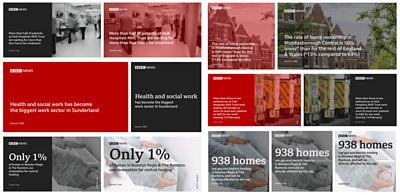
We then created a simple syntax within the template files where journalists could create automated graphics from the data sets — customising the text and imagery. One thing that definitely resonated was local imagery being used on the graphics.
The graphic creation was incorporated into the automated pipeline, so that graphics were automatically created along with story texts.
These assets can be used both off-platform, to attract audiences that the BBC are working hard to reach, and within articles, to reinforce key parts of the story. Publishing these stories on only the BBC News platform means we are only bringing them to people who already engage with BBC News content. There are, however, parts of the population who—for a multitude of reasons—do not feel that BBC News coverage is interesting to them. By creating stories that are more local to them, and by using easy-to-digest forms of media, such as these graphics, to engage them, we hope that we can better serve them as audience members.
Freeing journalists to focus on human interest
Impactful journalism is usually crafted around strong local narratives, built up from quotes and with people at the centre of the story. Data cannot do this, but using data can free up journalists’ time so that they can focus on building that narrative.
Our experiment with using data for hyperlocal stories highlighted many limitations of the approach, but it also demonstrated that there really is a great interest in more local stories, and an opportunity to engage with audiences at a more local level. Using systems like Salco can give insight to regional teams by doing the heavy lifting on the data and producing simple graphics for them to use. And while a method of delivery for hyperlocal stories doesn’t yet exist through the BBC’s content delivery, with greater personalisation and the emphasis on digital first, it could in the future.
You can read more about how we successfully used Salco to help cover the 2019 general election.
Latest news
Read all newsBBC News Labs
-

News
Insights into our latest projects and ways of working -

Projects
We explore how new tools and formats affect how news is found and reported -

About
About BBC News Labs and how you can get involved -

Follow us on X
Formerly known as Twitter




